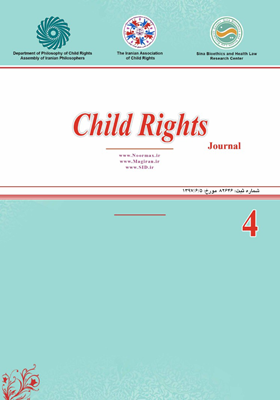Protecting Children against Inappropriate and Harmful Computer Games
Subject Areas : child rightsMohammas Javad Arabian 1 , Seyedeh Parisa Mirabi 2 , Ali Zand 3
1 - Ph.D. in International Law and Cyber International Law Investigator, Tehran, Iran
2 - Ph.D. Student in International Law, School of law, Islamic Azad University, Najafabad Branch, Najafabad, Iran
3 -
Keywords: Computer Games, Rights, the Protection of Children, Right to Happiness,
Abstract :
The use of computer games among children is rapidly expanding and it has become an integral part of children's daily lives. These games, with their innovative potential, can provide motivation for therapy, enhance practical skills and facilitate teaching and learning concepts. In addition to the positive aspects, playing these games has negative effects and on the other hand, kids drowning in computer games will lead to earn profits and benefits by the companies that make these games. This study, with descriptive-analytical method using domestic laws and regulations and internationals treaties and other library resources; was carried out to examine the protection of the children's rights from harmful computer games by applying sociological theories; domestic law and international documents and has used descriptive, analytical method aimed to ensure the right to play, enjoy and entertain. The present study was conducted aimed to examine the benefits and disadvantages of computer games to express legal requirements and protections and protect users from harmful effects of these games.
1. Chahardouli Z. As Voting Characters in Promotion of International Peace and Security, Proceedings of the Conference on International Law and Computer Games. Tehran: Mizannsher Publication; 2019. p.331.
2. Elsan M. Cyberspace Rights. Tehran: Shahredanesh Publishing The SD Institute of Law Reseach and Study; 2017. p.220.
3. Zandi MR. Preliminary research on cybercrime. Tehran: Jungle Publications; 2014. p.17.
4. Moini L. Using New Tools and Summaries in Teaching Human Rights to Youth, Online Computer Games Using the Server, Proceedings of the Conference on International Law and Computer Games. Tehran: Mizannsher Publication; 2019. p.196.
5. Mirabi SP, Zand A. Strategies for Preventing Delinquency of Children and Adolescents in Cyberspace. Maragheh: Second National Conference on Cyber Defense, Maragheh University; 2019.
6. Arabo A. Cyber Security Challenges within the Connected Home Ecosystem Futures.ELSEVIER. Procedia Computer Science 2015; 61: 227-232. Available at: http://www.sciencedirect.com.
7. Salahi J. Child and adolescent delinquency. The Legal Foundation of the extent. Tehran: Mizannsher Publication; 2009. p.78-79.
8. Amali SSR. A Two-Spatial Approach to Injury, Crime, Cyberspace Laws and Policies. Tehran: Amir Kabir Publishing; 2011. p.527.
9. Hosseini SD. Computer Games (A Look at Features, Musts and Don'ts). Journal of Rah Avard Noor 2012; 3(36): 28-33.
10. Zamani SGH. The Role of Computer Games in Children's Human Rights Education, Proceedings of the Conference on International Law and Computer Games. Tehran: Publishing Mizan; 2019. p.156.
11. Hosseini SH. Sociological Analysis of the Internet Relationship and Drug Addiction by Relying on Computer Communication Network Interfaces. Journal of Cultural Studies and Communication 2005; 2(3): 1-18.
12. Mir Mohammad Sadeghi H. Crimes against public security and comfort. Tehran: Extent; 2013. Chab.21.
13. Alipour H. Computer scam. Journal of Legal Research 2004; 3(6): 203-238.
14. Prensky M. Computer games and Learning: Digital game based learning. In Raessens J, Goldstein J. Cambridge: Handbook of computer Game Studies; 2005. p.101.
15. Brezinka V. Computer games supporting cognitive behaviour therapy in children. Clinical Child Psychology and Psychiatry 2014; 19(1): 100-110.
16. Brown SJ, Lieberman DA, Gemeny BA, Fan YC, Wilson DM, Pasta DJ. Educational video game for juvenile diabetes: Results of a controlled trial. Medical Informatics 1997; 22(1): 77-89.
17. Kato PM, Cole SW, Bradlyn AS, Pollock BH. A video game improves behavioral outcomes in adolescents and adults with cancer: A randomized trial. Pediatrics 2008; 122(2): e305-e317.
18. Olarte CR, López DM, Narváez S, Farinango CD, Pharow PS. A computer game to support cognitive therapies in children. Psychology Research and Behavior Management 2017; 10: 208-217.
19. Sakai T, Tamaki H, Yoshida R, Egusa R, Inagaki S, Yamaguchi E, et all. COSEY: Computer Supported Enhancement of Young Children’s Cooperation-Toward a Multiple-player Cooperative Full-body Interaction Game. Rome: 8th International Conference on Computer Supported Education; 2016. Vol.2 p.175-180.
20. Nasirzadeh S. Information technology and its role in the teaching and learning of students with cerebral palsy. Exceptional Education 2013; 13(5): 56-67.
21. Habiba S, Hosseinzadeh M. Investigating the Process of Legal Protection of Computer Games in the Intellectual Property System. Legal Research Quarterly 2013; 16(153): p37-68.
22. Mirshamsi H. Supporting Computer Games in International Intellectual Property Law, Proceedings of the Conference on International Law and Computer Games. Tehran: Mizannsher Publication; 2019.
23. Latonero M. Human Trafficking Online: The Role of Social Networking Sites and Online Classifides. USC, Annenberg: Centre on Communication Leadership & Policy; 2011. p.31-32. Available at: http://dx.doi.org/10.2139/ssrn.2045851.
24. Moazami SH. Juvenile delinquency. Tehran: Justice Publishing; 2016. p.162.
25. Abouzari M. Attitude to Criminal Law. Tehran: Audience Publication; 2017.
26. Masafa N. Children's Right to Play and Play Computer Games, Proceedings of the Conference on International Law and Computer Games. Tehran: Mizannsher Publication; 2019. p.147.
27. United Nations Office on Drugs and Crime Vienna. Study on the Effects of New Information Technologies on the Abuse and Exploitation of Children; 2015. p.38.


